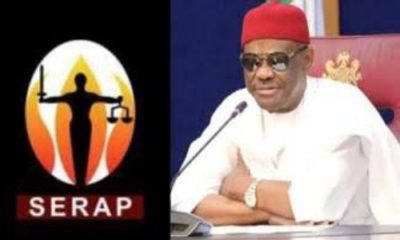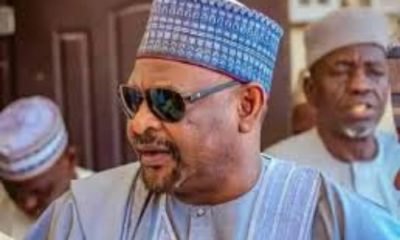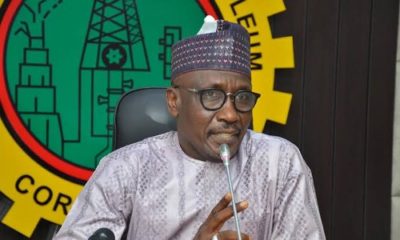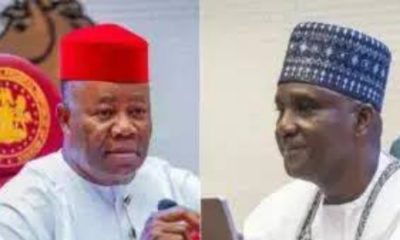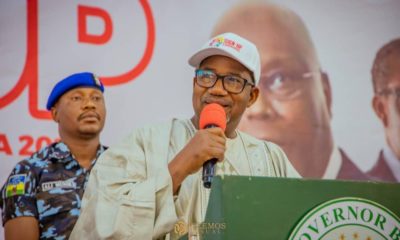NEWS
SERAP Petitions INEC For Electoral Reforms
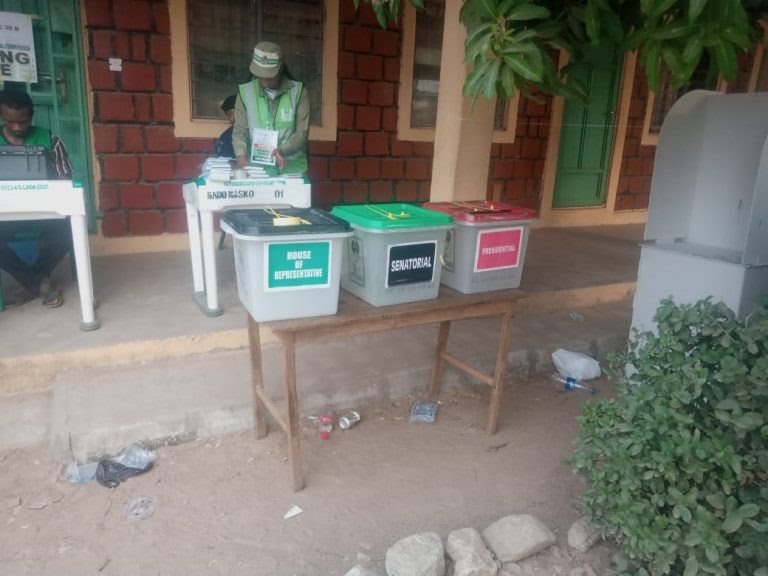
The Socio-Economic Rights and Accountability Project (SERAP) has urged Professor Mahmood Yakubu, the Chairman of the Independent National Electoral Commission (INEC) “to use the mandates of INEC to pursue constitutional and legal reforms that would ensure explicitly recognize Nigerians’ right to vote and to vote securely in free, fair and honest elections as a fundamental right.”
This was divulged in a statement made available to Biztellers on Sunday by Deputy Director, SERAP, Kolawole Oluwadare.
According to the him, the SERAP also urged INEC “to promote constitutional and legal reforms that would contain explicit mandatory provisions on internet voter registration, and the use of modern technology, including in casting and counting, voter registration and systems for reporting results.”
Biztellers reports the petition was dated October 28, 2023 under the signature of Deputy Director, SERAP, Kolawole Oluwadare, the organisation propounded inter alia for, “The explicit recognition of the right to vote and to vote securely would improve the right to representative democracy in the country.”
The SERAP stated, “The continuing resistance by politicians to bring the country’s electoral legal rules up to date with modern technology, and make the use of technology mandatory in our electoral process is entirely inconsistent and incompatible with Nigerians’ right to effectively participate in their own government.”
According to the SERAP, “Large-scale election infrastructure insecurity poses serious threats to the fundamental right to vote that (the) INEC can no longer ignore. The challenges facing the electoral process can be addressed by a swift adaptation and innovation in both election laws and election technology.”
In the petition, the SERAP maintained that the true essence of democracy is mass participation and that the advocated reforms would help guarantee this.
“Democracy works best when everyone participates. Legally enforceable right to vote is the bedrock of any democratic society. The right to vote and to vote securely is too important to be left to the whims of politicians” it added.
The reforms had also become necessary to shore up public confidence and mass participation in Nigeria’s civil rule. “Confidence in the electoral process is on the decline. Many Nigerians are expressing concerns about the credibility and integrity of the electoral process.”
On why the INEC must take the initiative, the SERAP pointed out that “Nigerian politicians have little incentive to pursue genuine constitutional and legal reforms that would improve the exercise by Nigerians of their right to participation in the electoral process and in the mechanisms of government.
(The) “INEC has constitutional and statutory responsibilities to promote and advance the right of eligible Nigerians to vote and to vote securely as part of their internationally recognized right to political participation.
“Under section 2(b) of the Electoral Act 2022, the commission ‘shall have power to promote knowledge of sound democratic election processes.’ INEC also has the constitutional mandates to take the recommended measures under Section 153 of the Nigerian Constitution and paragraph 15(a) of the third schedule.
(The) “INEC has the mandates to promote, protect and facilitate the exercise of the right to vote and to vote securely as a fundamental right. Exercising such mandates would rebuild public confidence in the ability of the commission to effectively perform its responsibilities and to act in good faith.”
On issues bedeviling electioneering and Nigeria’s democracy, the SERAP noted, “The major problem facing the country’s democracy is the lack of respect for Nigerians’ right to participation and the concomitant lack of trust in election results.
“If citizens do not believe in the election process, then the entire system of democratic government becomes a questionable enterprise.
“The explicit recognition of legally enforceable fundamental right to vote and to vote securely in free, fair and honest elections would protect the right to participation, safeguard and strengthen the credibility and integrity of the country’s democracy.
“It would rein politicians who continue to abuse the electoral rules to distort and undermine the right to participation with almost absolute impunity. It would also amplify the voices of the people, not corrupt politicians, and modernize and secure the country’s future elections against any threats.
“The country’s electoral legal rules are entirely inconsistent and incompatible with the requirements of the right to political participation, which is explicitly guaranteed under article 25 of the International Covenant on Civil and Political Rights and article 13 of the African Charter on Human and Peoples’ Rights which Nigeria has ratified.
“The right to vote and vote securely would also impose clear obligations on the electoral commission and other authorities to ensure the ‘will of the people’ in elections, and to administer elections in an objective and neutral manner, and in conformity with modern technology.
“The crisis confronting Nigerian elections and lack of public trust and confidence in the electoral process can be addressed if the right of Nigerians to vote and to vote securely is explicitly recognized as justiciable constitutional right.
“Nigerians do not currently enjoy explicit and enforceable right to vote and to vote securely. As the 2023 general elections have shown, the absence of this right in the Nigerian Constitution 1999 [as amended] has seriously undermined the right of Nigerians to effectively participate in their own government, and the credibility and integrity of the electoral process.
“Although the Nigerian Constitution provides in Section 14(1)(c) that, ‘the participation by the people in their government shall be ensured in accordance with the provisions of this Constitution’, this is not recognized as legally enforceable fundamental human right.”
In the light of the above, the SERAP cautioned that, “Unless (the) INEC urgently begins the process of pushing for the explicit recognition of Nigerians’ right to vote and to vote securely, politicians would continue to use the country’s antiquated electoral legal rules for personal gain, and to deny the people their right to participation.”
Noting the urgency the matter deserved the SERAP called on the INEC to act with minimum delay.
“We would be grateful if INEC begins the process of taking the recommended measures within 7 days of the receipt and/or publication of this letter. If we have not heard from you by then, SERAP shall consider appropriate legal actions to compel INEC to comply with our requests in the public interest.
“SERAP notes that ahead of the 2023 general elections, INEC disclosed that over seven million Nigerians who carried out their voter pre-registration online but could not complete the process at physical centres would not be entitled to vote.
“The right to vote and to vote securely as well as the right of the people to expect representative government through the process of elections is basic to democracy,” it stated.
Harping on the importance of the reforms, the SERAP added, “Without the explicit constitutional recognition of the right to vote and to vote securely as a fundamental right, millions of Nigerians would continue to be denied their right to participate in their own government.
“The Nigerian Constitution and Electoral Act are grossly inadequate to guarantee citizens’ right to political participation which encapsulates the right to vote and to vote securely. Our electoral legal rules are based on a set of archaic notions that do not serve the core function of participation and a representative democracy.
“The African Charter on Human and Peoples’ Rights, the International Covenant on Civil and Political Rights (ICCPR), and the African Charter on Democracy, Elections and Governance explicitly assert the right to vote as part of the fundamental right to participate in democracy.
“Article 25 of the Covenant, article 13 of the African Charter and articles 2, 3 and 4 of the African Charter on Democracy contain provisions on the right to participation. Nigerian electoral laws ought to be such that would give effect to the voters’ will and uphold the popular mandate through free, fair, and honest elections.
“The right to vote in a democracy is important because so many other matters depend upon its exercise. Nigeria ought not to be stuck with electoral rules, structures and procedures that violate basic ideas of participation, fairness and representative government.”
NEWS
How NERC’s New Commercial Billing Threatens Healthcare, Economy

The crippling impact of the newly introduced electricity billing, which classifies locations and businesses into two buckets of Band A or Band B has been decried.
President, Save-A-Life Foundation, Dr Richard Okoye, has expressed grave concerns about the scary electricity bill served on his hospital in Rivers State by the Port Harcourt Electricity Distribution (PHED).
His outcry was contained in a video clip which went viral on Thursday,
Following the new billing classification, which put his hospital in Band A, Dr Okoye was aggrieved that his monthly bill jumped to N25,300,000, which he noted would have devastating effects on the healthcare sector in Nigeria, as well as other businesses.
Dr Okoye is not the only person speaking up against the excessive hike in electricity bills.
President, the Trade Union Congress (TUC), Festus Osifo, had made a similar call during the May Day Rally in Abuja, where he strongly urged the Nigerian Electricity Regulatory Commission (NERC) to reverse the tariff hike within a week.
Osifo maintained that keeping the current billing levels would have severe impact on Nigeria’s economic growth, thus stressing the urgency of effective energy management to prevent further setbacks.
He maintained that the “glaring incompetence in managing this sector for the collective welfare of our citizens,” is a major factor constraining Nigeria’s economy.
The labour leader asserted that, “It is unethical to force Nigerians to pay higher tariffs for non-existent electricity. Estimated billing is an extortion and a daylight robbery against Nigerians.
Recall that the NERC on April 3, 2024 approved a significant increase in electricity tariffs for customers falling under the Band A classification.
Vice Chairman. NERC, Musliu Oseni, declared that the adjustment would raise the rate from the current N66 per kilowatt-hour to N225 per kilowatt-hour.
Though the billing reviews introduced by the NERC had attracted wide condemnation from Nigerians, the government had opted to stand behind the Commission.
For the government, the over 300 percent upward review was a take-it or leave-it for electricity consumers.
Nigeria’s Minister of Power, Adebayo Adelabu, who defended the scandalous review before the Senate pointed to the cost of infrastructure required to keep the sector running.
In his opinion, the only way to make the sector attractive to investors was to get the consumers to bear the cost of building and maintaining the infrastructure, which would also make the sector bankable.
Adelabu said, “For this sector to be revived, government need to spend nothing less than 10 billion dollars annually in the next 10 years.
“This is because of the infrastructure requirement for the stability of the sector. But government cannot afford that. And so we must make this sector attractive to investors and to lenders.
“So for us to attract investors and investment, we must make the sector attractive, and the only way it can be made attractive is that there must be commercial pricing.”
However, Dr Okoye’s position, which Netizens applaud, is that the government’s decision to jerk up Band A’s tariff, would be an epidemic against the healthcare sector and other busiensses.
He described moving from paying N66 per kilowatt to N225 per kilowatt as a ‘Band A tariff epidemic”, capable of destroying the healthcare system of Nigeria.
Dr Okoye said, “By reason of us (the hospital) being in Band A, our monthly power bill is now shooting up to N25,300,000. That’s crazy; the hospitals are not business centres but only renders essential services to society.
“This Band A tariff epidemic is bound to destroy the country’s healthcare system.
“We are already struggling with an influx of doctors leaving the country. The majority of the healthcare system is struggling, as it were. If nothing is done to urgently revisit that decision, the Band A tariff epidemics will turn most hospitals into morgues. Something that could be preventable.
“Power (electricity) is the life of the healthcare delivery. Patients have hope and a sense of living again when the light is in the hospital. In addition to that, the majority of emergency drugs and anaesthetic drugs always want to be at a particular temperature which can be sustained by electricity. If this decision persists, it will come to a point where most of the drug will be in an unusable state, and it is already happening.”
Narrating his experience during a medical engagement to elaborate on the need for a hospital to be on steady power supply, Dr Okoye pointed out that an elderly woman who was supposed to be operated upon was given the requisite volume of propofol needed for her to relax but could not sleep because the potency of the drug has reduced due to poor storage, occasioned by inadequate power supply.
“We were surprised and thought the woman was alcoholic, and the anaesthetic increased the dose a little and asked again, only for the woman to confirm that she was fine again.
“After evaluation, it was discovered that though the drug was original but not well preserved, it would lose potency.
“That is to say, those who are diabetic in Nigeria should brace up because the majority of them would see no way to buy their drugs.
“In fact, they need to travel miles to get a hospital with a steady light to get drugs they are taking.
“While this Band A is on, teaching hospitals and Federal Medical Centres which used to enjoy some relative form of light because perhaps they would not be billed like other people. They are now downgrading them to Band B and channelling Band A to those they feel can pay to the detriment of the people.
“I can count on and on. Power (supply) is what determines whether a surgical procession would be successful or not. It determines the ‘before and after’ outcome of any surgery.”
“If the instruments are not properly sterilised, they may be the ones resistant to all antibiotics known, that even when we start getting it right, the worst has already happened,” Dr Okoye pointed out.
According to him, the Nigerian government must act fast in this regard to avoid it having a severe impact on the hospitals, the healthcare system, the health of Nigerians, and businesses generally.
“My heart melts when a teaching hospital can pack its instruments to go and sterilise in another hospital because it doesn’t have light. The FG should act because it is preventable as it is now,” he stressed.
It would appear thought that the government might not have the final say on this, as a Federal High Court in Kano had already issued restraining orders on the NERC and the Kano Electricity Distribution Company (KEDC).
The court ordered the parties to refrain from implementing the new electricity tariff for Band A consumers.
NEWS
Kwara-based Catholic School Shines In 2024 UTME: 30 Students Score Above 300
The Eucharistic Heart of Jesus Model College, Ilorin, Kwara State, has made headlines with a remarkable achievement in the 2024 Unified Tertiary Matriculation Examination (UTME).
Revealed by Reverend Father Jude Okeh via his X handle, @friajudeo, the school proudly announced that 30 of its students scored impressively between 300 and 355 points.
Topping the list are Fasesin Ayomiposi and Kunle-Olawepo Ayomikun, both securing an outstanding 355 points.
Following closely are Adelodun Oluwadarasimi and Ayejuto Daniel with 341 points, and Idris Jamaaldeen with 333 points, showcasing the school’s commitment to academic excellence.
The UTME results have garnered attention amidst recent controversies surrounding the exam. With over 8,000 students nationwide achieving scores above 300, the proficiency demonstrated by these students from Eucharistic Heart of Jesus Model College stands as a testament to their dedication and the quality of education provided by the institution.
In a statement, Reverend Father Jude Okeh highlighted the significance of this achievement, particularly in light of the challenges faced by candidates nationwide.
Netizens have lauded the students’ success, acknowledging it as a remarkable feat amidst the backdrop of JAMB’s statistics, which revealed a significant number of candidates failing to meet the 200 marks threshold.
JAMB reiterated the purpose of the UTME as a ranking examination and cautioned against the proliferation of fake result slips.
The board emphasized the importance of relying on official channels for result verification, reaffirming its commitment to maintaining the integrity of the examination process.
The stellar performance of the students from Eucharistic Heart of Jesus Model College serves as a beacon of inspiration, reflecting the potential for excellence within the educational landscape of Kwara State and beyond.
NEWS
Fuel Crisis: No End In Sight As NNPC, IPMAN Fight Dirty

The ongoing fuel crisis appears to be a case of the grass suffering while two elephants fight.
The bone of contention seems to be that while the Nigerian Government wants to carry out minor reforms in the supply chain, and is assuring the public that the scarcity would end soon, the organised marketers appear focused on protecting the interests of its members.
Biztellers reports that about 8,000 operating licences of IPMAN’s members are threatened by a new policy of the National Petroleum Company Limited (NNPC Ltd).
Recall that the NNPC Ltd had placed a deadline of April 15, 2024, for marketers to renew their operating licences or risk being denied access to their customer express portals for the purchase of petroleum products from the NNPC Retail Limited.
However, the Independent Petroleum Marketers Association of Nigeria (IPMAN) had claimed that the registration processes and requirements were cumbersome, for which some of its members could not meet the deadline.
Consequently, the IPMAN requested an extension till July, so that its members could reconcile their licenses and address the lingering scarcity, which has compounded the economic woes confronting the ordinary Nigerian.
The IPMAN has also appealed to the Nigerian Midstream and Downstream Regulatory Authority (NMDRA) to release 9,000 already processed licences to its members.
The National Public Relations Officer, IPMAN, Chinedu Ukadike, gave an update on the Association’s position in a statement on Thursday in Abuja.
The statement read, “The Independent Petroleum Marketers Association of Nigeria are abreast with current developments in the downstream sector of our petroleum industry and wish to state that the latest information reaching us from the Nigerian Midstream and Downstream Petroleum Regulatory Authority states that they have already processed more than 9,000 out of the 15,000 licenses they are expected to process for our members within this period.
“Marketers are fast-tracking the processing of their licenses to avoid the impending closure of their customer express portals for purchase of petroleum products from NNPC Retail Limited.
“We, therefore, use this opportunity to appeal to the management of the NMDPRA and NNPC Retail Limited to respectively release the processed licenses and extend the deadline for delisting of marketers from their express portals.
“If our request is granted, it will ease the tension of panic buying by members of the public in order not to aggravate the present scarcity of petroleum products.”
In an earlier statement, the IPMAN had blamed the ongoing scarcity which had seen pump prices of Premium Motor Spirit (PMS) skyrocket to between N750/litre to N1,200/litre across Nigeria on turnaround maintenance of oversea suppliers of the product.
On its part, the NNPC Ltd had blamed logistics on the scarcity, which it claimed to have addressed.
The state oil company had also tried to address the situation by assuring of sufficient stock and increased product supplies, yet, the IPMAN members appear to be sticking to their gun, in protection of members’ interests, by controlling sales to the public.
Recall that the Chairman, IPMAN Depot Chairmen Forum, Yahaya Alhassan, had on Tuesday threatened to shut down the 30,000 stations operated by IPMAN members across the country if the Federal Government failed to pay the N200bn that was being owed marketers.
The IPMAN’s position was contained in a communique issued in Abuja by over the non-payment of marketers’ bridging claims.
According to the IPMAN, the NMDPRA had refused to clear the debt, which had continued to accrue since September 2022.
It might just be that the two elephants are keeping the bone of contention close their chests and feeding members of the public with tales by the moonlight.
In the interim, the economic hardship continues to bite harder, with common Nigerians at the receiving end.

